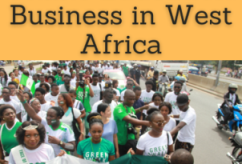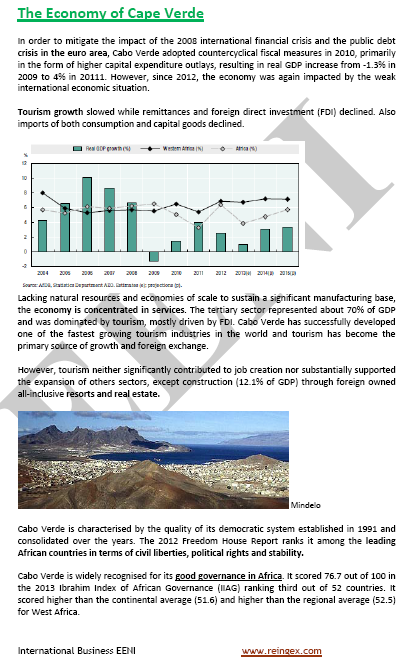Business in Cape Verde, Praia, Tourism

Cape Verde (Foreign Trade), tourism sector, leading in stability in Africa
- Introduction to the Republic of Cape Verde (West Africa)
- Business in Praia
- Cape Verdean Economy
- Tourism sector
- Foreign Trade of Cape Verde
- Business and Investment Opportunities in Cape Verde
- Cape Verde Investments
- Access to the Cape Verdean Market
- Business Plan for Cape Verde
The aims of the subject “Foreign Trade and Business in Cape Verde” are the following:
- To analyze the Cape Verdean Economy and Global Trade
- To know the trade opportunities in Cape Verde
- To explore the Cape Verdean trade relations with the country of the student
- To know the Cape Verdean Trade Agreements
- To develop a business plan for the Cape Verdean Market

The Subject “Foreign Trade and Business in Cape Verde” belongs to the following Online Programs taught by EENI Global Business School:
Master in Business in Africa, International Business, Foreign Trade.

Doctorate in African Business, World Trade.

EENI Partnerships with Educational Institutions

Languages:  or
or  Cap Verd
Cap Verd  Cabo Verde
Cabo Verde  Cabo Verde.
Cabo Verde.

International Trade and Business in Cape Verde.
Cape Verde: one of the World's fastest growing tourism sector


Cape Verdean Preferential trade agreements:
- Cape Verde and the West African Economic Area
- Economic Community of West African States (ECOWAS)
- African Continental Free-Trade Area
- Community of Sahel-Saharan States (CEN-SAD)
- AGOA (U.S.)
- EU-Cape Verde:
- Africa-EU Partnership
- GSP
- Special Partnership Agreement (SPA) with the EU

- WTO
- GATS
- Agreement on the Application of Sanitary Measures
- Agreement on Technical Barriers to Trade
- Agreement on Preshipment Inspection
- Agreement on Safeguards
- Trade Facilitation Agreement
- WCO

African Trade and Economic Organizations. Cape Verde is a member of:
- African Development Bank
- Economic Commission for Africa
- African Union
- AUDA-NEPAD
- Africa Agriculture Development Programme
- African Union Convention on Preventing and Combating Corruption (not signed)
- Africa-Asia Partnership
- China-Africa Cooperation
- Africa-India Cooperation
- Africa-BRICS
- Africa-Turkey Partnership
- Afro-Arab Cooperation
- BADEA

- WCO
- UN
- WB
- WTO
- IMF
- Archipelago formed by ten Islands (Atlantic Ocean)
- Capital of Cape Verde: Praia
- Area of Cape Verde: 4,033 km²
- Cape Verdean population: 491,000 inhabitants
- Life expectancy: 70 years
- Cape Verdean Official language: Portuguese
- Cape Verdean language: Creole
- Politics: Democratic Semi-Presidential with multiparty system
- Nearest countries (by sea) to Cape Verde: Senegal, the Gambia, Guinea Bissau, Mauritania, and Spain (Canaries)
- Independence of Cape Verde: 1975 (Portugal)
More information about Cape Verde (EENI African Business Portal).
Main religions in Cape Verde:
- Christianity - Catholicism (90% of the Cape Verdean population)
- African Traditional Religions

Cape Verde belongs to the West African Economic Area.

Economy of Cape Verde (Africa):
- Leading in civil liberties, political rights, and stability in Africa (Freedom House Report)
- Uncorrupt bureaucracy
- Service oriented economy
- The main sectors of the Cape Verdean economy are services (70% of the GDP, mainly tourism), agriculture (bananas, potatoes, sugar-cane, coffee, and peanuts), fish, and textiles
- Industry sector: 8% of the Cape Verdean GDP
- Informal sector: 70% of jobs/25% of the GDP
- Cape Verdean GDP growth: 3.1%
- Inflation in Cape Verde: 1.8%
- Main trade partners of Cape Verde: Euro-Zone countries (mainly Portugal)
- Currency of Cape Verde: the Cape Verdean Escudo (peg to the euro)
- Special regime for SME
- Existence of Free-Zone Enterprises
- Open to foreign direct investment
- 90% of the food is imported
Global Trade and Business in Cape Verde:

(c) EENI Global Business School (1995-2024)
We do not use cookies
Top of this page


